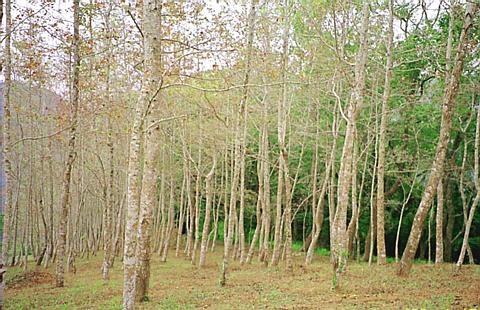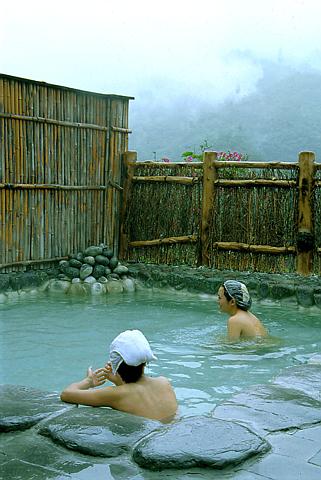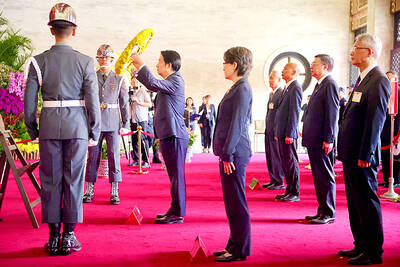You have to be totally naked to come in here," Mrs. Chen said matter-of-factly before opening a heavy wooden door and stepping out onto a steam-shrouded rock terrace.
The small area was totally enclosed, shielded from the hills beyond by a thick wall of bamboo and mountain vegetation.
"No swimsuits, no towels -- totally naked, that's our rule."

PHOTO: LIBERTY TIMES
The rock-pool's hot-spring waters were dappled with afternoon sunlight. Wisps of steam wafted skyward. If nudity is what it took, I assured Mrs. Chen, then nudity it was.
Tucked into a mountain valley and far removed from the neon KTV strip of central Chihpen, the Royal Hotel and Spa is a five-star resort that caters to people who feel the need, not only to get away, but to do so in high style. It's not cheap -- around NT$5,000 per night for a single room, with deluxe suites going for upwards of NT$20,000 per night -- but for those with a desire to be pampered, few destinations in Taiwan can match.
Close to Taitung, its surrounding areas are thought by many to be amongst the most scenic in all Taiwan. The hotel will help guests organize day trips to a variety of destinations that include local beaches and even -- by boat and plane -- the nearby diving havens of Green and Orchid islands.

PHOTO: LIBERTY TIMES
The only diving I planned to do, though, was in the spa, and I was impatient to get started. But Mrs. Chen, my guide from the hotel, had other plans for me.
For a start there was the "itinerary." Under normal circumstances it would not have been overly ambitious -- a nature hike at 4:30pm, dinner at six, an aboriginal dance performance at 8:15, a trip to the Chihpen forest reserve the following morning -- but given what we had already seen -- the large, heated outdoor pool, the tennis courts, a game room, a gym, the indoor spa equipped with a sauna, steam room, Jacuzzi, massage room, beauty parlor and more -- any itinerary at all seemed an obstacle to the resort's raison d'etre: relaxation.
"The water here is special," Mrs. Chen assured me as we passed by the spa area. "We pump it up from over 600 feet below ground so, unlike a lot of other springs in Taiwan, our water is odorless and tasteless. What you get is pure, clean carbonic spring water cooled to between 38 to 43 degrees Celsius -- perfect for soaking away aches and pains, increasing circulation and easing rheumatism and nervous tension."
I was eager to soak away my aches and pains and my nervous tension, so the moment Mrs. Chen left me to my own devices I was shedding my new, complimentary kimono robe and taking a mandatory quick shower. It being a Monday afternoon, I was pleased to discover I had the entire place to myself.
I started with a soak in a large, tiled, hot-spring pool. My toes created tiny eddies on the surface of the otherwise glass-flat water. With only my nose above water I began to feel weightless. I might have languished there for hours, but time was against me. My "itinerary" nagged at my conscience, and so for the next few minutes I ran naked between the cold pool, the sauna, the power shower, the Jacuzzi, the steam room, the whirlpool, back to the power shower and, finally, to the regular shower.
Not that all the rushing about did me any good. Feeling faint, I still had to run to make my my nature trail appointment.
Mr. Chen (no relation to Mrs. Chen) was waiting for me near the front desk. "I thought you weren't coming," he said, checking his watch.
I apologized for being late and we headed for a small cement path that wound up a well-forested mountain at the back of the hotel.
Along the way Mr. Chen, an aboriginal from the Beinan tribe, pointed out flowers and wild fruits.
"These are papaya trees, and these over here, are mountain kugua plants," he said.
I nodded blankly as sweat poured from my hot-spring overheated body.
"You can boil them to make tea and Chinese medicines," I heard him saying as I concentrated on not tumbling off the mountain path and plunging into the valley below.
By the time we got back for the dinner buffet, I was starving. I loaded my plate with sushi, prime rib, salad and mussels, and plowed through the mountain of food. I had my sights set on the game room, where I planned to get in a few rounds of "Pit Fighter" before the aboriginal dance performance started at 8:15.
This wasn't such a good idea because NT$200 later I suddenly heard the strains of faraway aboriginal dance music mingling with the cacophony of "Pit Fighter" and realized that I was late again.
By the time I got to the outdoor amphitheater and took a seat among a smattering of hotel guests, the A-mei tribe, wearing bright traditional costumes with beads and spangles attached to their wrists and ankles were already deep into rice harvest celebrations. In fact it was worse than I thought. As I joined the applause at the end of the song I'd arrived at during mid-performance, I realized it was the last of the show.
There was little to do at this point but return to the spa for a massage and another soak.
My morning call came at 8am, giving me plenty of time to prepare for the trip to the Chihpen forest reserve that was scheduled to depart the hotel at 8:45.
And that's when I noticed the large, empty hot tub basin in the bathroom. I haven't tried that yet, I thought to myself. Surely I had time for a quick soak before breakfast?
After filling it up and stepping gingerly inside I laid my head back and closed my eyes. The little tension left in my body after the previous day's soaks and massage melted away. My muscles were relaxing. The "carbonic spring water" was improving my circulation, soaking away my aches and pains, dissipating my "nervous tension." It felt good. It felt so good I fell asleep again.
I woke with a start an hour later, sending water splashing over the edge of the brimming tub. I had missed the bus. I had deviated from the "itinerary". I pictured Mr. Chen standing by the van, checking his watch and tapping his foot. I pictured the other passengers sitting crammed in the hot, idle van, becoming angry with me. I pictured scowling looks, sour faces.
And then I thought, forget it. Spas are for relaxing, right? I was going to relax. Who needs itineraries anyway?
As I closed my eyes and drifted off to sleep again, I wondered vaguely if I would make it to the breakfast bar before 10am. Not that I really cared.
For your information:
Bookings for the Hotel Royal Chihpen spa may be made by calling 2523-8877 or (089) 510-686. Or visit their website:
www.hotel-royal-chihpen.com

RESPONSE: The transit sends a message that China’s alignment with other countries would not deter the West from defending freedom of navigation, an academic said Canadian frigate the Ville de Quebec and Australian guided-missile destroyer the Brisbane transited the Taiwan Strait yesterday morning, the first time the two nations have conducted a joint freedom of navigation operation. The Canadian and Australian militaries did not immediately respond to requests for comment. The Ministry of National Defense declined to confirm the passage, saying only that Taiwan’s armed forces had deployed surveillance and reconnaissance assets, along with warships and combat aircraft, to safeguard security across the Strait. The two vessels were observed transiting northward along the eastern side of the Taiwan Strait’s median line, with Japan being their most likely destination,

‘NOT ALONE’: A Taiwan Strait war would disrupt global trade routes, and could spark a worldwide crisis, so a powerful US presence is needed as a deterrence, a US senator said US Senator Deb Fischer on Thursday urged her colleagues in the US Congress to deepen Washington’s cooperation with Taiwan and other Indo-Pacific partners to contain the global security threat from China. Fischer and other lawmakers recently returned from an official trip to the Indo-Pacific region, where they toured US military bases in Hawaii and Guam, and visited leaders, including President William Lai (賴清德). The trip underscored the reality that the world is undergoing turmoil, and maintaining a free and open Indo-Pacific region is crucial to the security interests of the US and its partners, she said. Her visit to Taiwan demonstrated ways the

GLOBAL ISSUE: If China annexes Taiwan, ‘it will not stop its expansion there, as it only becomes stronger and has more force to expand further,’ the president said China’s military and diplomatic expansion is not a sole issue for Taiwan, but one that risks world peace, President William Lai (賴清德) said yesterday, adding that Taiwan would stand with the alliance of democratic countries to preserve peace through deterrence. Lai made the remark in an exclusive interview with the Chinese-language Liberty Times (sister paper of the Taipei Times). “China is strategically pushing forward to change the international order,” Lai said, adding that China established the Asia Infrastructure Investment Bank, launched the Belt and Road Initiative, and pushed for yuan internationalization, because it wants to replace the democratic rules-based international

WAR’S END ANNIVERSARY: ‘Taiwan does not believe in commemorating peace by holding guns,’ the president said on social media after attending a morning ceremony Countries should uphold peace, and promote freedom and democracy, President William Lai (賴清德) said yesterday as Taiwan marked 80 years since the end of World War II and the Second Sino-Japanese War. Lai, Vice President Hsiao Bi-khim (蕭美琴) and other top officials in the morning attended a ceremony at the National Revolutionary Martyrs’ Shrine in Taipei’s Zhongshan District (中山) to honor those who sacrificed their lives in major battles. “Taiwanese are peace-loving. Taiwan does not believe in commemorating peace by holding guns,” Lai wrote on Facebook afterward, apparently to highlight the contrast with the military parade in Beijing marking the same anniversary. “We